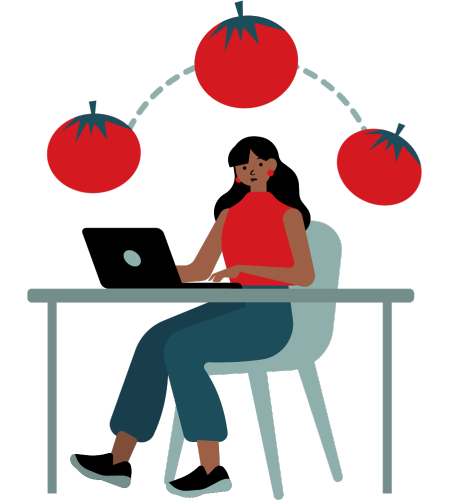Expert Insights
How to Revise for A Levels
Published 21st June 2024 by Alastair

How to Revise for A Levels: 7 Tips
Effective revision techniques are key to achieving the desired A Level grades, but some students develop bad revision habits without realising.
For some students, the jump in difficulty between GCSE and A Levels is overwhelming, and they have lost the motivation to catch up. For other students, the A Level format is manageable, but revision feels futile: the information goes in one ear and comes out the other. If this feels familiar, you are not alone.
No matter where you are in your A Level journey, if you feel that you have plateaued in your A Level revision, this article will help. Utilising key findings from academic papers and insights from our A Level experts, our 7 tips can teach you the best revision practices. We will be looking at creating efficient study schedules, employing active learning strategies, managing stress, and more!
You might
also want to familiarise yourself with A Levels first, and you can do
that in this guide.
Being organised from the get-go will help with all the other tips on this list, so we've put it at number one. Without having a clear idea of your academic goals and how to achieve them, your revision will not be as efficient or effective. Below are some ways to ensure you are organised with your revision.
Design and Follow An Effective Revision Timetable
Before you start revising, you should create a realistic timetable that aligns with your academic strengths and weaknesses. A good revision timetable will distribute subjects evenly and weight them more favourably to the subjects you are weaker in. It will also be designed to pace your learning throughout the week rather than cramming everything over the weekend. It should also be visually appealing and easy to follow, so get your coloured pens out and start assigning colours to subjects!
While we haven't made a timetable template for A Levels, you can check out our free GCSE revision timetable template and follow the instructions, format, and structure to create an appealing and easy-to-follow one.
Take Advantage of Organisation and Revision Apps
If creating a timetable with pen and paper feels antiquated, plenty of apps can do the work for you. Adapt has a sleek UI with a built-in timetable and a progress tracker and houses a compilation of revision resources and past papers with feedback! if you're someone who prefers using an iPad or smartphone to organise yourself, then an app like Adapt could be for you.

Create a Routine
By organising yourself, establishing a regular study plan, and starting your revision early, you can turn revision into a disciplined habit that will benefit you not only during your A Levels but also throughout your undergraduate studies and beyond. Starting early allows you more time to build a solid understanding of each topic or subject.
Expecting to excel in exams with minimal preparation is like entering a weightlifting competition after just one gym session, expecting to outperform competitors who have trained for years. While the phrase "your brain is a muscle*" is cliché, it holds the truth: reinforcing your knowledge over time, akin to building muscle, is far more effective than last-minute cramming.
Start Early
Studies have shown that students who begin revising early and maintain consistent study habits tend to achieve higher grades. Conversely, those who cram the night before often achieve lower grades and struggle to retain information beyond the exam. For those considering postgraduate studies in a specific subject, developing a strong foundational understanding is crucial compared to short-term cramming, which may harm your long-term academic prospects.
(*Note: Your brain isn't a muscle, it's an organ; we'll give that one to you for free, biology students!)
If you need help understanding how A Level Grades work, check out our guide: A Level Grades: Explained.
Below are some of the key ways to familiarise yourself with the assessment formats:
Know the syllabus. During your revision, ensure a comprehensive coverage of the syllabus. That way, when you come to the later stages of your revision, such as practising past papers, you will not be slowed down when you come across a section with topics you've not covered before, and you can focus on exam technique.
Identify question types and learn how to answer them. Often, there is a rather formulaic structure to grading. Examiners will have a set of guidelines to follow and will look for key information in your answers. You need to get to the correct answer and often show your methodology, which can differ from question to question and subject to subject.
Imagine two students answering the same 7-mark maths question: one who does all the working out in their head and writes down the correct answer but fails to show their work, and one who writes down their workings out, but makes a mistake in their final calculation. Who is going to get the higher mark for that question? Student number two will get 6/7 marks, even if they get the answer wrong. The first student, who got the correct answer, didn't show how they got to the answer and will only get a 1/7 mark.
This five-point difference could be a difference between the two grades. This is why it's crucial to understand what the examiners are looking for.
Practice your pacing. Written exams are usually designed to assess a student's broader understanding of a subject, and this is typically done by weighting questions differently rather than distributing one mark per question. Therefore, knowing how much time to spend on a particular section or question is key. Get good at looking at the clock, understand how long it takes you to answer a type of question, identify how long to spend on a section, and, if it comes to it, be prepared to skip answering questions worth fewer marks if you're low on time and focus on answering the ones that give you more. The best way to get good at this is through experience and practising loads of past papers, which we will address below.
Practice with past papers. We have a whole section on this (with resources!) as we feel that this is one of the most essential tips, but the only way you'll get good at exams is by practising them. There's no better way.
If you would like extra support with your A Level revision, our subject-specific A Level Tutors can help you with your revision journey.
Running through past papers can help tackle many aspects of revision at once:

While the academic world has criticised the widely-held belief of four defined 'learning styles', discovering individualised learning approaches is still important.
Learning preferences may not be strictly confined to categories like "kinesthetic" or "visual"; however, certain methods may prove more effective for individuals over others. Whether you learn better through discussion, such as teaching others, auditory instruction, visual aids such as mind-maps or flash cards for memorisation, or writing notes, identifying and consistently using the most effective methods will help you with your motivation and results.
In truth, it is probably best to employ various learning strategies rather than rely solely on one approach. Incorporating holistic methods such as the Pomodoro Technique can also enhance your learning experience.
Videos, such as this one, can help you learn how to use it effectively.
Regular Breaks are important, as they help with your ability to perform tasks, such as studying. However, what is even more important is how you take your break. A 2019 study showed that going on your phone on your break reduces your brain's ability to 'recharge' and is more 'cognitively taxing' than expected. Therefore, if you take a break, put your phone away.
Avoiding distractions will lead to far better learning time. In an age of app notifications, reduced attention spans, and social pressure to respond to people immediately, it can be hard to put your phone away without worrying that someone will call you with an emergency if you turn it on silent for an hour a day.
The only way to get over this is through practice. Make it a habit of turning your phone off, leaving it in the other room, or hiding it somewhere that's hard to get to so that you aren't tempted to use it during your learning or your break time.
If you use a phone app to study, use other apps such as Freedom, Cold Turkey, or SelfControl to block other apps and websites you know distract you. You could also just keep your phone in aeroplane mode.
Getting enough sleep is crucial not just for doing well academically. Research consistently shows that quality sleep helps your brain consolidate what you've learned during the day, making remembering and applying that knowledge during exams easier.
Studies have shown that insufficient sleep or irregular sleep patterns can lead to increased stress, anxiety, and mood swings, which can affect one's ability to focus and handle school pressures effectively. Establishing good sleep habits and aiming for 7-9 hours of sleep each night is important to support your academic success.
Listening to your body is important. If you feel overwhelmed by stress, consider getting support from school counsellors, your parents or guardians, or trusted adults who can provide valuable support and guidance in managing academic pressures.
Exercising and maintaining a good diet are also incredibly important to cognitive function. Ensure you are fuelling your body and keeping active, as both contribute to cognitive retention.
By prioritising good sleep, keeping active, eating well, managing stress and seeking support when needed, you can create a healthy balance that supports your academic achievements and overall well-being.

Effective A Level revision involves using a variety of methods to boost your chances of success. First off, make sure to create a study plan to establish a consistent revision routine. Practising past exam papers is also key to familiarising yourself with the exam format and question types. Don't forget to figure out your favourite learning methods, take regular breaks, and avoid distractions to keep your revision sessions both productive and interesting. It's also important to take care of your physical and mental health, as it helps you stay focused and reduces stress.
If you need some extra support, Ivy Education's expert tutors can help you improve these skills and make the most out of your revision. Don't hesitate to contact our Family Education Team to find out how we can help.
We recommend starting as early as possible. Whenever you start, Ivy Education's expert tutors can help.
Every student is different, but if you aim to revise regularly every day, then you shouldn't need to revise for more than 40 minutes per day. You can amp this up as you get close to the exam, but make sure to avoid burnout.
There isn't one. We recommend finding revision techniques that best suit your learning style and sticking to them. We also recommend more holistic revision methods, such as the Pomodoro technique, that can be applied to all subjects.
If you're reading this in April of your final year and you've only started revising, then we would recommend getting a tutor to help consolidate your learning and help you build an effective study plan to help with your last two months of preparation.
If you are reading this earlier, then we would recommend starting as soon as possible.
There is no such thing as revising enough. There is always something to learn from revising, even if it is not the content itself and you're getting 100% in every exam.
Revising teaches you self-discipline, and using your brain to recall information is incredibly healthy. Just don't overdo it!
A mixture of one or more subjects a day can be beneficial, depending on the day, what you've learned that week, and how much time you have. For example, if it's a weekend and you have time, you could spend an hour each on two subjects. But remember to give your brain a rest to absorb information.
For personalised support, Ivy Education's expert tutors can help you develop these skills and maximise your revision efforts. Contact us today to learn more.
Contact Us














